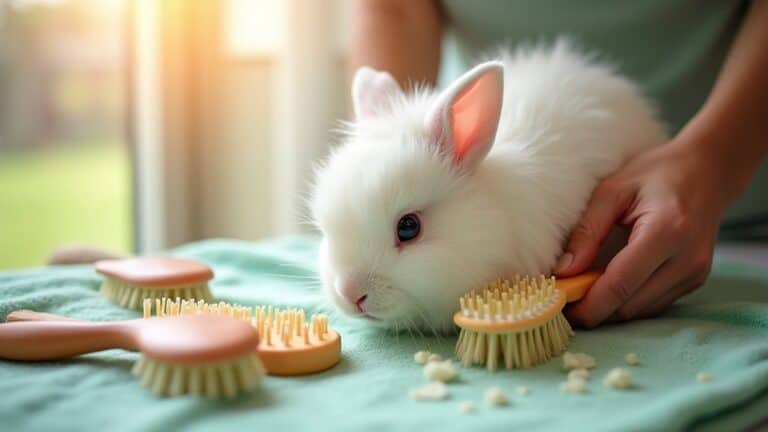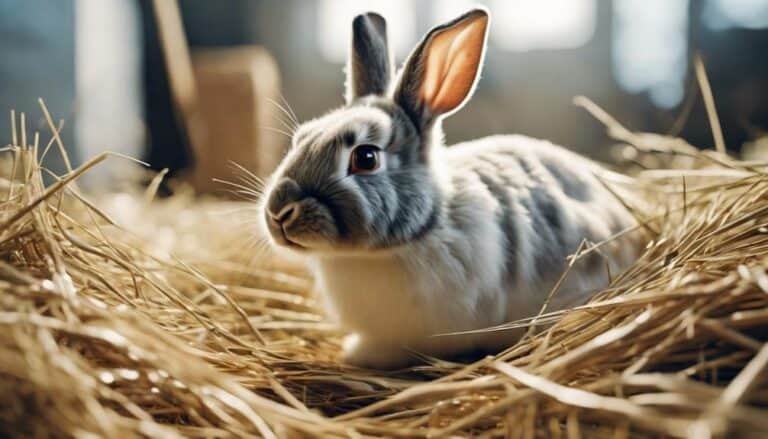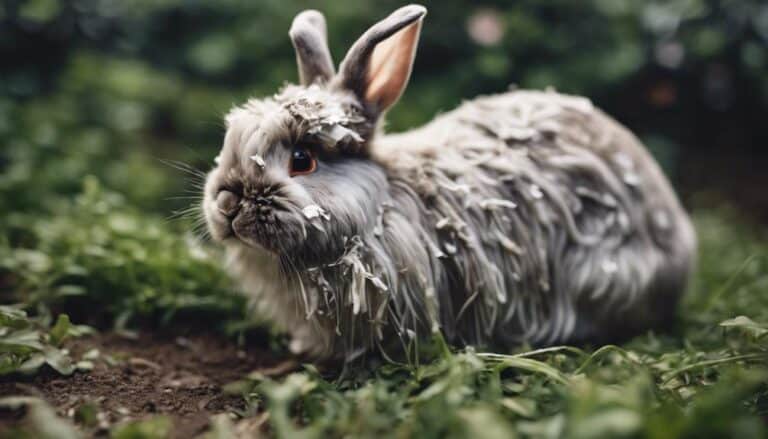Did you know that gastrointestinal stasis is one of the most common health issues in pet bunnies, affecting up to 20% of them each year?
Ensuring the well-being of your furry companion is paramount, and taking preventive measures can make a significant impact on their health.
By implementing these 10 essential tips, you can help safeguard your bunny against GI stasis and promote a happy, healthy life for your beloved pet.
Contents
- 1 Key Takeaways
- 2 Balanced Diet for Bunny Health
- 3 Adequate Water Intake for Bunnies
- 4 Regular Exercise for Bunnies
- 5 Stress Management for Bunnies
- 6 Monitoring Bunny's Weight
- 7 Proper Grooming Practices for Bunnies
- 8 Environmental Enrichment for Bunnies
- 9 Routine Veterinary Check-Ups for Bunnies
- 10 Avoiding Sudden Dietary Changes for Bunnies
- 11 Promoting Dental Health in Bunnies
- 12 How Can Preventing Hazards Help Avoid GI Stasis in Bunnies?
- 13 Frequently Asked Questions
- 14 Conclusion
Key Takeaways
- Ensure a high-fiber diet with hay and veggies to prevent GI stasis
- Monitor water intake closely and offer various water sources
- Provide supervised exercise daily to stimulate gut motility
- Regular veterinary check-ups help detect and prevent GI stasis issues
Balanced Diet for Bunny Health
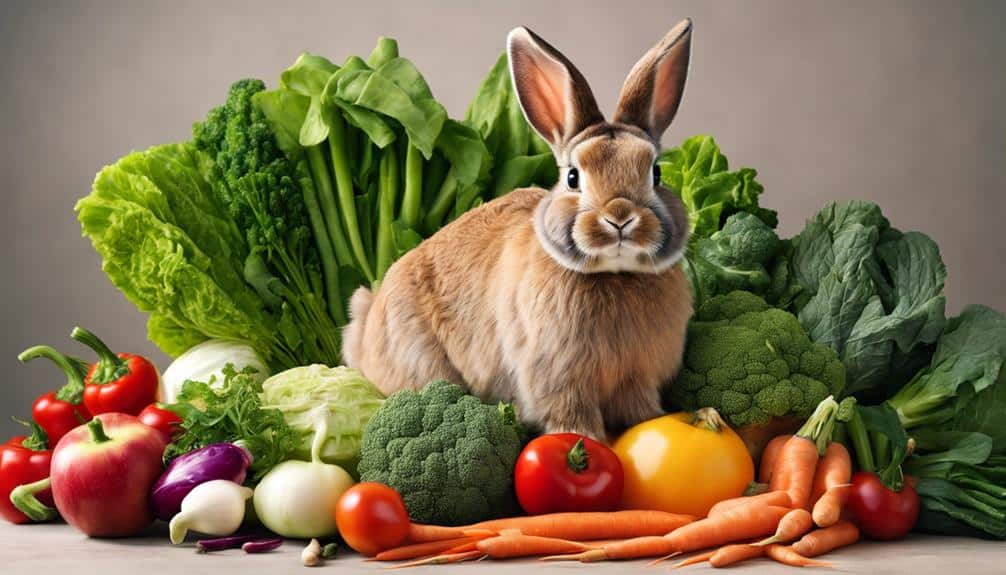
To maintain a balanced diet is essential for health and prevent GI stasis in bunnies.
High-fiber hay should be the cornerstone of your bunny's diet, as fiber plays a vital role in maintaining gut health and preventing GI stasis.
Make sure that your bunny has access to a variety of fresh vegetables, limited pellets, and minimal sugary treats.
Avoid feeding foods that are high in carbohydrates or low in fiber, as these can increase the risk of digestive issues like GI stasis.
Adequate Water Intake for Bunnies
Guarantee your bunny stays hydrated by providing fresh, clean water consistently to prevent dehydration, a common trigger for GI stasis.
Offering various water source options like bowls and bottles can entice your bunny to drink more.
Monitor your bunny's water intake closely to guarantee they're drinking enough each day to reduce the risk of GI stasis.
Hydration Importance for Bunnies
An important aspect of maintaining the health of your bunny is making sure they have consistent access to fresh, clean water to support hydration and prevent gastrointestinal stasis.
Here are some essential tips to keep your bunny well-hydrated:
- Monitor Water Levels: Regularly check your bunny's water bottle or bowl to make sure they're drinking enough.
- Refill as Needed: Keep their water source topped up to encourage regular drinking throughout the day.
- Offer Leafy Greens: Incorporate leafy greens with high water content into your bunny's diet to boost hydration levels.
- Prevent Dehydration: Adequate water intake aids in digestion and reduces the risk of gastrointestinal blockages in your bunny's delicate system.
Water Source Options
Maintaining an adequate water intake for your bunny is crucial for preventing dehydration and reducing the risk of gastrointestinal stasis, especially when considering different water source options. Make sure your bunny has access to fresh, clean water at all times to prevent dehydration, a common trigger for GI stasis.
Providing multiple water sources in various areas of the enclosure can encourage increased water intake throughout the day. Water bottles with sipper tubes are a popular choice, keeping water clean and easily accessible. Bunnies may prefer ceramic or metal water bowls over plastic ones for durability.
Monitoring Water Consumption
Monitoring your bunny's water consumption is essential for ensuring proper hydration and preventing gastrointestinal stasis. To maintain peak health, follow these tips:
- Calculate Water Intake: Offer 50-150 ml of water per kilogram of body weight daily.
- Watch for Dehydration Signs: Look out for reduced water intake, dry mouth, sunken eyes, or lethargy.
- Provide Fresh Water: Offer clean water in a heavy ceramic bowl or sipper bottle.
- Track Changes: Monitor water consumption daily, considering diet, temperature, activity, and health conditions.
Regular Exercise for Bunnies
To maintain your bunny's digestive health and prevent GI stasis, it's important to make sure they get 3-4 hours of supervised exercise outside their enclosure each day. Movement is key in stimulating gut motility and reducing the risk of digestive issues like stasis.
Create indoor play spaces and provide interactive toys to keep your bunny active and healthy.
Importance of Movement
Regular exercise plays an essential role in preventing GI stasis in bunnies by promoting gut motility and reducing the risk of gastrointestinal issues. To keep your bunny healthy and active, follow these tips:
- Encourage Playtime: Provide opportunities for hopping, running, and exploring outside the cage.
- Prevent Obesity: Regular movement helps in maintaining a healthy weight and reduces the chances of stasis-related complications.
- Stimulate Digestion: Exercise aids in the natural movement of the digestive tract, preventing food buildup and blockages.
- Space for Freedom: Make sure your bunny has ample space to move around freely and engage in physical activities for their overall well-being and digestive health.
Indoor Play Spaces
Encouraging your bunny to engage in physical activities within indoor play spaces is important for maintaining their overall well-being and preventing gastrointestinal issues like GI stasis. Indoor play spaces provide a safe environment for your bunny to exercise, explore, and engage in natural behaviors like hopping and running.
These spaces promote physical activity, helping to prevent obesity and maintain healthy digestion, thereby reducing the risk of GI stasis. By incorporating tunnels, toys, and hiding spots in the indoor play area, you can encourage your bunny to stay active and mentally stimulated.
Regular exercise in these spaces is essential for preventing stress-related GI problems, ensuring your bunny's mental and physical enrichment. Make indoor play a priority to support your bunny's health and well-being.
Interactive Toys for Stimulation
When selecting interactive toys for your bunny's stimulation and regular exercise routine, consider options like puzzle feeders and tunnels. These toys provide mental stimulation and encourage physical activity, helping prevent GI stasis in rabbits.
Here are some essential interactive toys to keep your bunny active and healthy:
- Puzzle Feeders: Engage your rabbit's mind by providing treats or pellets in puzzle feeders that require them to work for their food.
- Tunnels: Bunnies love to explore and run through tunnels, which promotes exercise and playtime.
- Foraging Balls: Encourage natural foraging behavior by placing hay or treats inside foraging balls that make your rabbit work for their food.
- Interactive Games: Consider interactive toys like rolling treat dispensers or hide-and-seek toys to keep your bunny entertained and physically active.
Stress Management for Bunnies
To effectively manage stress in bunnies and prevent gastrointestinal stasis, creating a safe and enriched environment is essential. Stress can disrupt normal gut motility in bunnies, potentially leading to gastrointestinal stasis. Common stressors for bunnies include loud noises, sudden environmental changes, and the presence of predators.
To guarantee stress levels, provide a safe, quiet, and enriched living space for your bunny. Make sure the environment is free from potential stress triggers as much as possible. Regular handling, socialization, and mental stimulation are also key to lowering stress in bunnies. By interacting with your bunny daily and offering a variety of toys and activities, you can help them stay mentally engaged and content.
Monitoring your bunny for signs of stress and promptly addressing any sources of anxiety or discomfort can notably contribute to preventing gastrointestinal stasis. Remember, a happy and stress-free bunny is less likely to develop digestive issues.
Monitoring Bunny's Weight
Regularly monitoring your bunny's weight is important for detecting any sudden changes that could signal potential health issues related to GI stasis.
Sudden weight loss or gain could indicate underlying problems like dental issues or gastrointestinal disturbances, both of which are risk factors for GI stasis.
Weight Monitoring Importance
Monitoring your bunny's weight is a key aspect of maintaining their overall health and preventing potential issues like GI stasis. Here are some reasons why weight monitoring is important:
- Early Detection: Regularly weighing your bunny can help catch any sudden weight changes that might signal health problems.
- Overall Health Evaluation: Tracking weight is pivotal in evaluating your bunny's well-being, particularly in preventing GI stasis.
- Sign of Underlying Issues: Sudden weight loss or gain could indicate digestive issues, dental problems, or other medical conditions.
- Timely Intervention: Monitoring weight allows you and your vet to address any concerns promptly, ensuring your bunny's health and happiness.
Signs of Weight Loss
Detecting signs of weight loss in your bunny is important for identifying potential health issues early on. Regularly monitoring your bunny's weight is vital as sudden or gradual weight loss can be a red flag for GI stasis or other underlying health issues.
Using a digital scale to track weight changes accurately is recommended. If you notice significant fluctuations in your bunny's weight, consult a rabbit-savvy vet promptly. Weight loss in bunnies can stem from various causes like reduced food intake, dental problems, GI issues, or other illnesses affecting their well-being.
Early detection of weight loss and timely intervention are key in preventing severe complications and improving the prognosis for bunnies at risk of GI stasis.
Proper Grooming Practices for Bunnies
To guarantee peak health and well-being for your bunny, incorporating proper grooming practices is essential in preventing gastrointestinal stasis and other digestive issues. Regular grooming helps prevent hair ingestion, reducing the risk of hairballs and potential GI stasis in bunnies.
Here are some essential grooming practices to keep your bunny healthy:
- Brush Regularly: Brushing your bunny frequently removes loose fur that could be ingested during grooming, promoting digestive health.
- Pay Attention to Long-Haired Breeds: Long-haired bunny breeds may require more frequent grooming to prevent fur matting and ingestion issues.
- Check for Abnormalities: Grooming allows you to check for signs of skin irritation, parasites, or abnormalities that could lead to stress and GI problems.
- Overall Well-being: Proper grooming practices contribute to overall well-being by keeping your bunny clean, comfortable, and less prone to digestive complications.
Environmental Enrichment for Bunnies
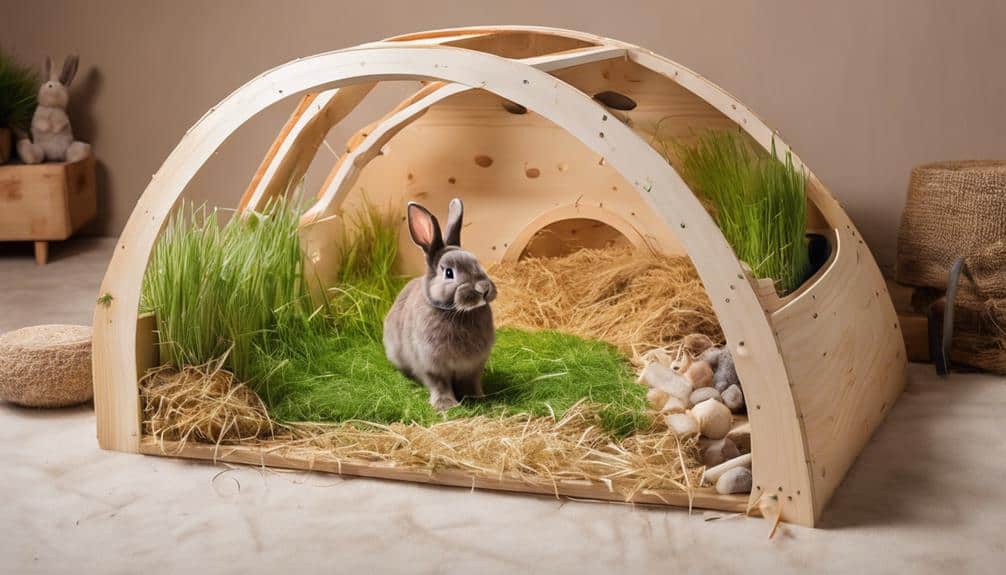
Enhancing your bunny's environment with engaging enrichment activities and stimulating accessories is important for promoting their overall well-being and preventing gastrointestinal stasis. Providing a variety of toys, tunnels, and hiding spots can help reduce stress levels, contributing to better gut health. Introducing safe chew toys and interactive items not only promotes physical activity but also stimulates your bunny mentally, aiding in their digestive system's well-being. Rotating and adding new enrichment items regularly can prevent boredom, encouraging natural behaviors that support a healthy digestive tract.
Creating a stimulating environment that mimics a rabbit's natural habitat with opportunities for exploration and playtime is key to promoting gut motility and reducing the risk of stasis. Ensuring a safe and spacious living area with suitable substrates and textures encourages bunnies to stay active, preventing sedentary habits that could lead to gastrointestinal issues. By focusing on environmental enrichment and stress reduction, you can significantly enhance your bunny's quality of life and overall gut health.
Routine Veterinary Check-Ups for Bunnies
To ensure peak health for your bunny and effectively prevent potential issues, scheduling routine veterinary check-ups is vital. Regular visits to a rabbit-savvy veterinarian play an important role in maintaining your bunny's well-being and avoiding complications such as GI stasis. Here's why these check-ups are essential:
- Early Detection: Veterinary check-ups help identify any underlying dental disease, infections, or illnesses that could lead to GI stasis in bunnies.
- Preventive Care: A thorough examination by a veterinarian can prevent and address potential causes of GI stasis before they escalate, ensuring your bunny stays healthy.
- Tailored Advice: Routine visits allow for discussions on diet, exercise, and stress management strategies personalized to your bunny's needs, reducing the risk of GI stasis.
- Overall Well-Being: These visits provide an opportunity to discuss preventive care measures with your veterinarian, promoting your bunny's digestive health and overall quality of life.
Avoiding Sudden Dietary Changes for Bunnies
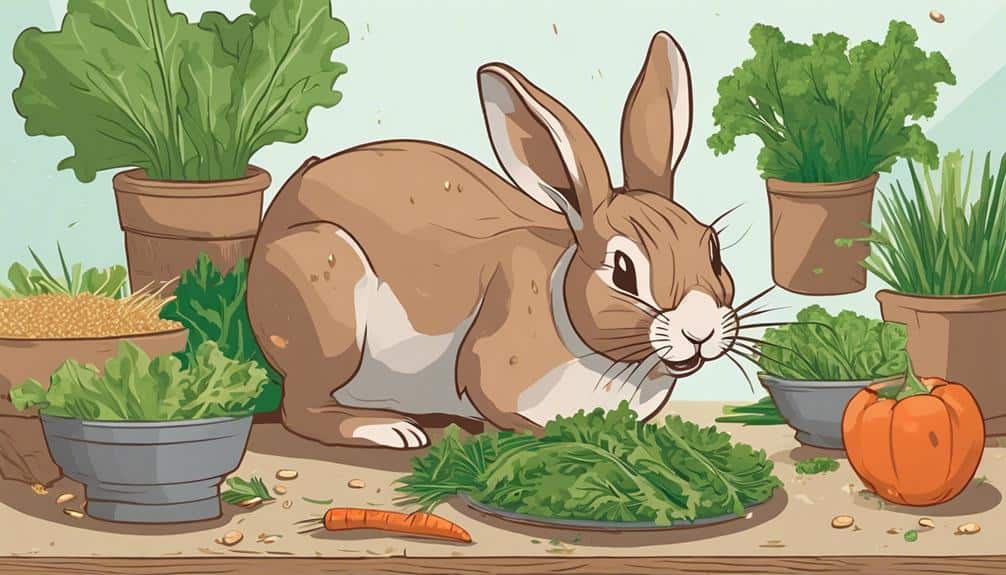
Avoid sudden changes in your bunny's diet to safeguard their delicate digestive system and prevent the risk of GI stasis. Sudden dietary alterations can disrupt the balance of bacteria in their intestines, leading to gastrointestinal (GI) stasis. This condition occurs when the normal movement of food through the digestive tract slows or stops, potentially causing severe health issues for your bunny.
To avoid this, introduce new foods gradually to allow your bunny's gut flora to adjust and minimize the chances of digestive upsets. Abrupt shifts in diet can cause imbalances in gut bacteria, affecting digestion and increasing the risk of GI stasis. It's essential to maintain a consistent and balanced diet for your bunny to promote healthy digestion and prevent intestinal problems like stasis.
Consulting with a rabbit-savvy veterinarian before making significant changes to your bunny's diet is important. This proactive step can help minimize the risk of GI stasis and ensure the continued digestive health of your beloved pet.
Promoting Dental Health in Bunnies
When considering your bunny's well-being, ensuring proper dental care is fundamental to prevent potential complications that can arise from overgrown teeth. Here are four essential tips to promote dental health in bunnies:
- High-Fiber Diet: Providing a diet rich in hay and leafy greens is important for maintaining good dental health in bunnies. The constant chewing required to break down fibrous foods helps wear down their teeth naturally, preventing overgrowth.
- Chew Toys: Offering a variety of safe chew toys made from natural materials like wood or hay helps bunnies grind down their teeth and prevents them from becoming too long. Chew toys also provide mental stimulation and prevent boredom.
- Regular Veterinary Check-ups: Scheduling routine dental check-ups with a rabbit-savvy veterinarian is essential for detecting any dental issues early on. A professional can address overgrown teeth or other problems promptly to avoid further complications.
- Avoid Sugary Treats: Limiting sugary treats in your bunny's diet is important for dental health. Instead, focus on providing a well-balanced diet centered around hay, vegetables, and a small amount of pellets to promote overall well-being and prevent dental problems.
How Can Preventing Hazards Help Avoid GI Stasis in Bunnies?
Preventing GI stasis in bunnies is crucial for their well-being. By keeping bunnies safe: hazards avoidance is paramount. Monitoring diet, ensuring ample exercise, and avoiding stressful environments help maintain their digestive health. Regular veterinary check-ups can catch early signs, ensuring swift treatment and recovery.
Frequently Asked Questions
How Do You Prevent GI Stasis in Rabbits?
To prevent GI stasis in rabbits, focus on dietary modifications like high-fiber foods and limiting sugary treats. Encourage exercise, provide constant access to fresh water, and create a stress-free environment. These steps promote gut motility and overall digestive health.
Can You Reverse GI Stasis in Rabbits?
Yes, you can reverse GI stasis in rabbits with prompt veterinary care. Address the underlying cause, offer supportive treatment, and monitor progress closely. Hydration, pain relief, and gut motility support are essential for effectively reversing GI stasis in rabbits.
What Helps Rabbits Digest?
To aid in rabbit digestion, guarantee a fiber-rich diet, sustain proper hydration levels, and incorporate exercise routines. These elements promote healthy gut motility, nutrient absorption, and prevent gastrointestinal issues. Prioritize these factors for your bunny's well-being.
How Long Will Rabbit Live With GI Stasis?
If left untreated, rabbits with GI stasis may survive only a few days. Timely intervention and proper treatment can improve your rabbit's prognosis. Monitoring symptoms, seeking vet care, and implementing care strategies can extend their life expectancy.
Conclusion
To sum up, by following these 10 essential tips for preventing GI stasis in bunnies, you can guarantee your furry friend stays healthy and happy.
Just like a well-crafted recipe, a balanced diet, regular exercise, and routine check-ups are the key ingredients for a bunny's well-being.
By incorporating these tips into your bunny care routine, you can help them hop along the path to a long and vibrant life.

